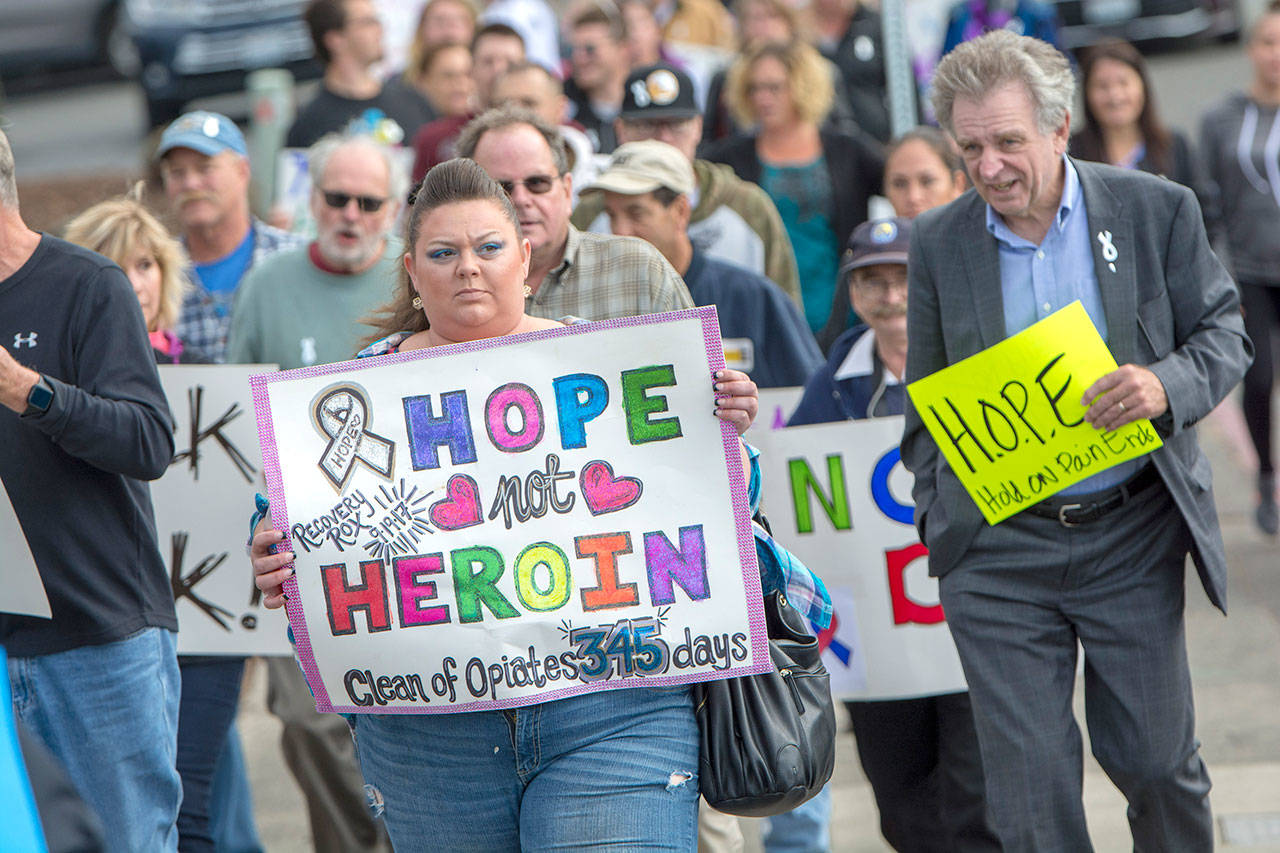PORT ANGELES — Many who speak at the annual International Overdose Awareness Day walk in Port Angeles typically start by introducing themselves as recovering addicts.
Jason Vickers took a different approach Friday as he spoke to close to 200 people who walked from the steps of the Clallam County Courthouse to the Port Angeles City Pier to raise awareness of how opioids affect the community.
“I’m somebody’s son, I’m somebody’s brother, I’m somebody’s father, I’m somebody’s nephew, I’m somebody’s cousin, I’m somebody’s friend, I’m somebody’s confidant,” he told a cheering crowd.
Many who attended the walk were those in the recovery community and people who have had friends and family die from drug overdoses. Several people involved with the court system and from treatment facilities attended as well.
The fourth annual walk was organized by Port Angeles Citizens Action Network and The Answer For Youth.
Vickers, who was one of several people who spoke Friday, urged those who attended to learn more about naloxone, a drug that reverses opioid overdoses.
Clallam County — the first county in the state to have mandatory overdose reporting — has seen a steady decrease in reported overdoses since recording began in 2016.
There were 62 reported overdoses in 2016 and only 31 reported overdoses in 2017. The stats, recorded quarterly, show a steady decrease nearly every quarter.
Clallam County health officials have hypothesized that this decrease may be because the county distributes naloxone at the county syringe exchange and that fewer overdoses are reported because there are fewer hospitalizations.
“If you have anybody in your life close to you who is using or in danger of using, talk to other people who know about this stuff,” Vickers said. “We can come back from addiction, but we can’t come back from death.”
Vickers told the crowd about beginnng to use illegal drugs and an overdose that led to him losing everything.
“Some of us grow up in really wild circumstances and it takes a toll on us,” Vickers said. “I learned early on … about things to smoke, things to drink and things to ingest that made me feel different … and like I could get through those situations I thought I wasn’t going to get through otherwise.”
In November 2013.,Vickers said life had gotten difficult and the drugs made him feel great. All of his problems went away.
“I came home from work that day … I used and the lights went out,” he said. “Then I snapped back into consciousness and I was laying there on the floor and looking up and there was just faces everywhere.”
Paramedics walked him out of his apartment — past his apartment manager — and took him to Harborview Medical Center in Seattle.
While at Harborview, a nurse sat Vickers on a gurney outside the morgue and told him he would be back shortly. The nurse never came back for him, Vickers said.
“At the time I was really mad at that guy,” he said. “But look back now and I realize this is the man who has seen this so many times he is sick to death of it. He didn’t know what else to do at the time. He really was trying to show me something.”
That wasn’t when Vickers decided to get sober. It was only the beginning, he said.
“My desire to get high outpaced my means and my financial ability to do that, so there went the house, the business and everything,” he said. “Now I’m doing this in the alley.”
His family tried to help, but he wasn’t listening, he said. They attempted an intervention but he wasn’t ready to let go of the drugs.
Vickers had gotten into trouble and picked up warrants as he continued to use for three years.
“For me, surrendering came Nov. 24, 2016,” he said.
Officers made contact with him while he was asleep in a parking garage and they asked him for his name.
“I put my hands out and said ‘my name is Jason Vickers and I have warrants and I just want to get out of here,’ ” he said. “I knew then that the only way out then was through, and I knew that meant prison time. It was better than the alternative.”
While in prison Vicker searched for help with his recovery and he found support. When he was released, he came to Port Angeles — a city he knew little about and had no ties to.
“I got the opportunity to be here and I started meeting people through recovery,” he said. “I started to realize for a relatively small town you have a huge recovery community here and it’s a huge gift to be a part of it.”
What helped him stay sober in Port Angeles — the seat of a county that is disproportionately affected by opioid abuse — was by living at an Oxford House, he said.
It was an experience he didn’t enjoy, but is grateful for. Vickers said that while he lived at an Oxford House he was vulnerable, was forced to talk to people and learned accountability.
Despite his accomplishments since getting clean, life is still tough, he said.
“The reason I started using is because life is tough and I didn’t know what to do about it,” he said. “Life is still life, but it’s through spending time with people like you that I learned how to deal with this stuff.”
________
Reporter Jesse Major can be reached at 360-452-2345, ext. 56250, or at jmajor@peninsuladailynews.com.

